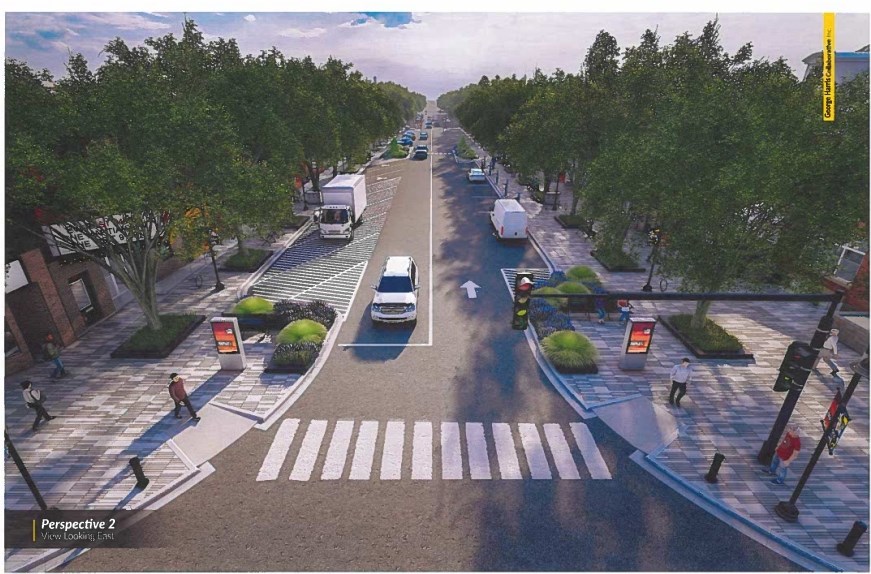ESTEVAN -
The 1100 and 1200 blocks of Fourth Street are going to look very different at the end of 2024.
The City of Estevan has received $7.75 million in federal funding for the upgrades to Fourth Street from the federal government. Estevan city council approved the funding during Monday night's meeting and also agreed to spend $1.5 million for the underground infrastructure upgrades in the two blocks of downtown Estevan as part of the work.
City manager Jeff Ward said the project represents a full rehabilitation. It will include new mature trees with underground planters, new sidewalks and paving stones, all of the connections into the buildings, new pavement, asphalt and street lighting.
"There won't be much left from what's there," said Ward.
Streetscapes will be the most expensive component, he said. There will be a significant amount of paving stones as the sidewalks will be much larger to encourage pedestrian walkways and people gathering in the downtown core.
"Everything from lighting to benches to all of those amenities is covered in the estimated engineering designs," said Ward.
New parks and other attractions won't be included in this phase, he said.
A request for quotes has been issued so that potential bidders can look at the design, and submit their qualifications and estimated costs.
"As we get closer to knowing who the general contractor might be, we'll make sure that we do stakeholder engagement with all of the downtown businesses to see how they're going to be impacted by the scope that's being done at certain times," Ward said.
In a report to council filed for Monday night's meeting, Ward said the money will come from the federal government's Canada Coal Transition Initiative (CCTI) fund, which is administered through Prairies Economic Development Canada (PrairiesCan). The city was advised on Feb. 29 that it would receive the money.
"A requirement of the funding is that the city must also contribute funds towards the project. Through discussions, it was determined the city would allocate $1.5 million … to complete the underground utilities on the downtown revitalization project," Ward wrote.
He noted the city has been looking at downtown revitalization dating back to the summer of 2021 through their meetings with Doug Griffiths and his company 13 Ways, which promoted the benefits to communities that invest in the area. George Harris Collaborative was awarded the design contract later that year. The company worked with city administration and council, along with the Estevan Downtown Business Association, to begin the discussion.
Multiple open houses and surveys gave citizens and businesses the chance to provide input on the design. Ward pointed out there are eight optional phases, totalling $33 million, for council to consider, as part of the downtown project.
For council to be awarded the funding, it would have to allocate city funds for the project, and the undergrounds were selected.
The first component of the Fourth Street project will be removing the existing trees prior to April 15. Stakeholder engagement will continue through the entirety of the project.
All of the work associated with the federal funding has to be completed by March 31, 2025.
Council members voiced their support for the project. Coun. Shelly Veroba said it was great news for the community. She pointed out a lot of people who called her wanted to know if this money would go to another community if Estevan didn't accept it.
"Yes, the federal money is taxpayer dollars. It comes from all of us. But if Estevan, Saskatchewan, didn't do this and do the downtown revitalization project, then another city in Canada, maybe not even in Saskatchewan … was going to get these funds," said Veroba.
Coun. Rebecca Foord added some people wanted to know why the funds couldn't go to the new Estevan Regional Nursing Home, but the way the granting works, the city had to apply for a specific project. Other people were concerned about the timelines.
"This project is going to be done very quickly. It's going to be done, hopefully, with as little disruption as possible," said Foord, who asked the city's marketing division to work with the community as openly as possible.
Coun. Lindsay Clark encouraged people to support the downtown businesses as much as possible in the coming months.
"We know that it's going to be disruptive, but it would have been disruptive if we just did the undergrounds," said Clark.
Coun. Kirsten Walliser praised the Downtown Business Association for bringing people downtown through the street dance, the Christmas Miracle on Fourth Christmas sale and the night markets.
"People from Eastern Canada have recommended, over and over, how happy and at home they feel using the night markets, and this project allows us to build that so that even more people in our community can feel that sense of belonging," she said.
To pay for the underground component of the project, the city will borrow an additional $1.5 million, to ensure it can properly manage cash for any unexpected issues. The city is now scheduled to operate in 2024 with no net debt reduction.
"This is an opportunity for us to upgrade infrastructure … for years to come," said Coun. Tony Sernick. "Another thing to note too, is this allows us to have the cash ready for unexpected issues."
He predicted the project will remain on budget.
The other option Ward had presented was to allocate $1.5 million of funds from the 2023 year-end balance, which was approximately $2.3 million.
More than a dozen members of the public were at the meeting. A number of them were from the Downtown Business Association, which has supported the project, but some of them were with Concerned Citizens Estevan SK, who released a video earlier this year questioning the project and claiming it would cost $40 million-$50 million as opposed to the amount quoted by the city. Neither side spoke at the meeting.






